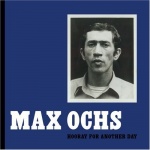|
|
 |
Dusted Reviews
Artist: Max Ochs Album: Hooray For Another Day Label: Tompkins Square Review date: Nov. 19, 2008 |

|
|
|
 |
Guitarist Max Ochs recorded the two tracks that bookend Vol. 1 of the Imaginational Anthem series – two versions of the composition that gave the series its name, one recorded in Och’s Takoma heyday in 1969, the other just before the album was released. Listening to them closely, it is hard to say exactly how Ochs grew or changed in the interim. Both cuts are lovely, haunting, but at the same time physically rigorous. You could hear his fingers sliding on the strings, scraping sometimes as they reached for another chord. And there was a swinging, swaggering rhythm to the whole thing, a sense that it might pick up and saunter off at any moment.
Here on Hooray for Another Day, Och’s first solo album in many years, there is yet another version of this song, and again, it is hard to draw a straight line from the old to the new. Said Ochs, when interviewed about the tune, “The Imaginational Anthem ….evolved taking many shapes like the Trickster before that recording day. And it still ain’t finished.” It was, he added, “a tribute to Fahey, a play on ‘National Anthem,’ a rhythm derived from ‘Put Another Nickel In.’ I was lovin’ the Beatles’ ‘Yesterday’ and ‘Blackbird.’”
Ochs was, of course, a contemporary of John Fahey and Robbie Basho (he taught Basho his first folk songs), a member of an East Village blues enclave that welcomed Mississippi John Hurt and Skip James when they visited the city. Like his more famous cousin Phil, he got caught up in the 1960s social protest movement. However, in Max Och’s case, this took the form of direct help for the hungry – not songs dedicated to them. He has a direct, plainspoken, regular guy aura to him. His Hooray for Another Day intersperses gorgeous, blues-tinged, slide-haunted guitar pieces with poems that not only use the first person and the simplest of American words: they often rhyme.
Now let’s get this out of the way. Ochs is not nearly as good a poet as he is a musician. His song “Phil” is interesting, in the way that personal recollections of famous people can be interesting, but it is far too uncompressed and literal and self-referential to provide the transcendent lift of real verse. “An Apple Place in Annapolis” is better, evoking the lost paradise of an apple orchard where Ochs used to work with his wife. But really: Putting poems in between songs makes the album a tough listen. Once or twice is perfectly sufficient to get the gist of the poems. The guitar pieces require harder, more repetitive consideration, layered as they are with unexpected depths and resonances. Listen enough to get the gist of the instrumentals and you’ll be sick of the poems. Stop when you’ve sucked the marrow from the poems, and you’ll miss the best of the music.
That would be a shame, because this music is very, very fine, from the bongo-paced, Eastern-tinged blues of the title track, to the righteous country picking bravado of “Victor’s Rag,” to the slow, unfurling pleasures of raga-tinged “Oncones.” Ochs tips a weathered hat to Fahey in the spiritual “In Christ There Is No East or West,” its slow measures stately, its faster ones raggedly full of joy. His playing doesn’t have the spiritual mysticism of Basho or the restless, questioning intellect of Fahey, but it is solid and real and rooted in the best of ordinary human experience.
By Jennifer Kelly
|







